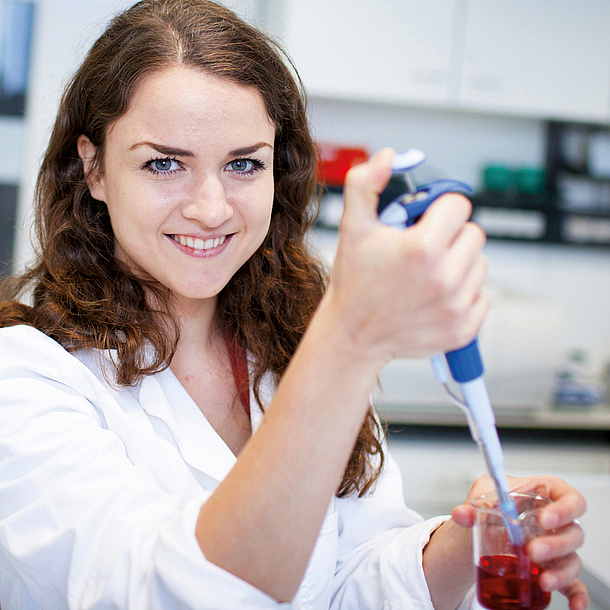Quick Facts
- Duration of study: 4 semesters
- ECTS credit points: 120
- Academic degree: Master of Science (MSc)
- Language of instruction: German
The Master's Programme
The interdisciplinary Master's degree programme in Biochemistry and Molecular Biomedicine includes aspects of biology, chemistry and medicine. This programme emphasizes research-led teaching, in which intensive practical application plays a major role alongside theoretical knowledge.
From the 2nd semester and on, you will apply and deepen your theoretical knowledge in laboratory exercises. This prepares you to carry out biochemical and molecular biological experiments as well as biomedical analyses independently. In the 4th semester, you will write your master's thesis as part of a research project.
Due to the international nature of the research, numerous lectures are held in English. International guest lecturers are integrated into the teaching, and you as a student are encouraged to participate in mobility programmes (e.g. Erasmus+).
During the course of your studies, you will gain a solid foundation of knowledge in the fields of medical biochemistry and metabolic physiology, molecular biology, cell biology, structural biology, bioinformatics and biophysics.
- You will learn to apply working and analytical techniques that are commonly used in biochemistry, molecular and cell biology as well as in structural biology and biophysics.
- You will conduct state-of-the-art experiments.
- You will evaluate the results of the experiments, recognize problems and propose solutions.
- You will learn how to critically analyse scientific data, interpret it responsibly and correctly and provide comprehensive presentations.
- You will use modern information technologies and imaging techniques.
- You will work in teams and present the results of projects or scientific work.
Focus Areas
You will gain basic knowledge in the subject area in the following four compulsory modules:
- Cell and Metabolism – subjects include molecular biology and the biochemistry of gene expression, cell biology, gene regulation and metabolism
- Structural Biology, Biophysics and Bioinformatics – subjects include: biophysical methods, structural biology and bioinformatics
- Analysis in Biochemistry and Biomedicine – subjects include: biochemical analysis, laboratory exercises, biostatistics, imaging techniques
- Research Biochemistry and Molecular Biomedicine – work in the project laboratory is encouraged, and the practical experience is supported by courses on scientific theory
You can set individual focal points in the following elective modules:
- Cell and Metabolism – subjects include: metabolic regulation, molecular human genetics and biochemical pharmacology
- Structural Biology, Biophysics and Enzymology – subjects include: molecular and applied enzymology, biocatalysis and protein design
- Analysis in Biochemistry and Biomedicine – subjects include: mass spectrometry in lipidomics and metabolomics, isotope technology and fluorescence technology
- General Elective Module – subjects include: presentation, technology assessment and science communication
Collaborations and Networks
The Master's degree programme in Biochemistry and Molecular Biomedicine is offered jointly by TU Graz and the University of Graz, taking place in an internationally recognized science and teaching environment. The two internationally visible research foci are:
- lipid metabolism and
- the application of enzymology, protein biochemistry and structural biology in the field of biocatalysis.
While working on research projects, students learn how to use state-of-the-art research methods and equipment, including those for mass spectrometry, nuclear magnetic resonance (NMR), molecular dynamics simulation, X-ray structural analysis, calorimetry and much more.
Admission
1. Admission Procedure
Graduates of the Nawi Graz Bachelor’s Degree Programme in Molecular Biology are admitted without needing to fulfil any further conditions. Other preliminary studies that are eligible for admission with and without conditions can be found in the curriculum (in German).
Graduates of other bachelor's degree programmes can obtain information and apply for admission by contacting study@tugraz.at.
2. Admission
- Admission and deadlines for Austrian students who are beginning their studies at TU Graz for the first time
- Admission and deadlines for international students
- If you are or were already admitted to a degree programme at TU Graz, please come to the TU Graz Registrar’s Office in person during the admission period or contact study@tugraz.at.
Fragen zur Zulassung?
Contact study@tugraz.at
Career Prospects
Professional Fields
Whether they are needed to perform basic academic research or applied research in an industrial or scientific setting: graduates of this master's degree programme are in great demand.
You can choose from a wide range of exciting activities in the fields of biochemistry, medicine, molecular diagnostics and pharmacy. In your professional career, for example, you can work:
- in pharmaceutical research and production,
- as a biochemical researcher in the field of medicine,
- at university or non-university research institutions and
- in facilities in the public sector.



